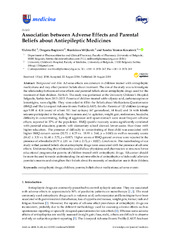| dc.creator | Ilić, Violeta | |
| dc.creator | Bogićević, Dragana | |
| dc.creator | Miljković, Branislava | |
| dc.creator | Vezmar-Kovačević, Sandra | |
| dc.date.accessioned | 2019-09-02T12:03:31Z | |
| dc.date.available | 2019-09-02T12:03:31Z | |
| dc.date.issued | 2018 | |
| dc.identifier.issn | 1010-660X | |
| dc.identifier.uri | https://farfar.pharmacy.bg.ac.rs/handle/123456789/3049 | |
| dc.description.abstract | Background and Aim: Adverse effects are common in children treated with antiepileptic medications and may affect parental beliefs about treatment. The aim of the study was to investigate the relationship between adverse effects and parental beliefs about antiepileptic drugs used for the treatment of their children. Methods: The study was performed at the University Children's Hospital, Belgrade, Serbia from 2013-2015. Parents of children treated with valproic acid, carbamazepine or lamotrigine, were eligible. They were asked to fill in the Beliefs about Medications Questionnaire (BMQ) and The Liverpool Adverse Events Profile (LAEP). Results: Parents of 127 children (average age 9.88 +/- 4.16 years) of whom 111 had epilepsy (67 generalized, 44 focal) and 16 with febrile seizures participated in the study. Nervousness and/or agitation, weight gain, restlessness, headache, difficulty in concentrating, feeling of aggression and upset stomach were most frequent adverse effects, reported in 37% of the population. BMQ-specific necessity scores significantly correlated with parental education; parents with elementary school showed lower scores than those with higher education. The presence of difficulty in concentrating of their child was associated with higher BMQ concern scores (20.73 +/- 4.25 vs. 18.99 +/- 3.60, p = 0.043) as well as necessity scores (18.42 +/- 3.31 vs. 16.40 +/- 2.73, p = 0.017). Higher scores of BMQ-general overuse were reported in the presence of a headache (8.79 +/- 2.81 vs. 7.64 +/- 2.72, p = 0.027). Conclusions: The main finding of our study is that parental beliefs about antiepileptic drugs were associated with the presence of adverse effects. Understanding this relationship could allow physicians and pharmacists to structure better educational programs for parents of children treated with antiepileptic drugs. Education should be more focused towards understanding the adverse effects of antiepileptics which could alleviate parental concerns and strengthen their beliefs about the necessity of medication use in their children. | en |
| dc.publisher | MDPI, Basel | |
| dc.relation | info:eu-repo/grantAgreement/MESTD/Basic Research (BR or ON)/175023/RS// | |
| dc.rights | openAccess | |
| dc.rights.uri | https://creativecommons.org/licenses/by/4.0/ | |
| dc.source | Medicina-Lithuania | |
| dc.subject | antiepileptic drugs | en |
| dc.subject | children | en |
| dc.subject | parents | en |
| dc.subject | beliefs about medications | en |
| dc.subject | adverse events | en |
| dc.title | Association between Adverse Effects and Parental Beliefs about Antiepileptic Medicines | en |
| dc.type | article | |
| dc.rights.license | BY | |
| dcterms.abstract | Миљковић, Бранислава; Везмар-Ковачевић, Сандра; Богићевић, Драгана; Илић, Виолета; | |
| dc.citation.volume | 54 | |
| dc.citation.issue | 4 | |
| dc.citation.other | 54(4): - | |
| dc.citation.rank | M22 | |
| dc.identifier.wos | 000448335400011 | |
| dc.identifier.doi | 10.3390/medicina54040060 | |
| dc.identifier.pmid | 30344291 | |
| dc.identifier.scopus | 2-s2.0-85054388051 | |
| dc.identifier.fulltext | https://farfar.pharmacy.bg.ac.rs//bitstream/id/1655/3047.pdf | |
| dc.type.version | publishedVersion | |

